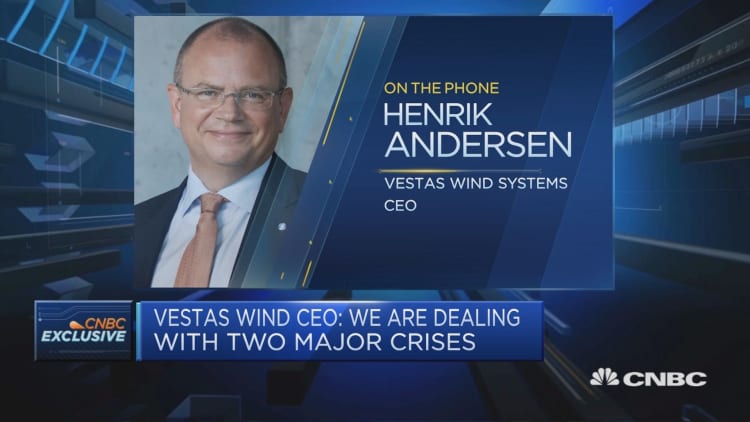The European Union's landmark plan to become climate-neutral by 2050 promises to overhaul the bloc's economy, and 20 regional companies are well placed to capitalize on these changes, according to Goldman Sachs.
The EU Green Deal, which the U.S. investment bank termed the "largest economic stimulus Europe has seen since the Marshall Plan," aims to achieve net zero carbon emissions by 2050 and a 50%-55% cut in emissions by 2030 compared with 1990 levels.
Along with protecting long-term wealth by tackling climate change, Goldman analysts believe the plan — which they "conservatively estimate" will cost in the region of 7 trillion euros ($7.9 trillion) — will boost short-term GDP (gross domestic product) and employment thanks to a "major investment wave in power infrastructure, buildings renovation, automotive and industrials."
Utilities
Goldman analysts suggested that the boost to capital expenditure brought about by the 27 EU member states' National Energy Plans (NEPs), the action plans for countries to hit the bloc's 2030 decarbonization targets, could see a spike in earnings for European utilities much sooner than expected.
The note projected that NEPs imply around a 65% capex acceleration in clean infrastructure (renewables and networks) in Europe versus the current run rate, with "visible effects" as of 2021.
"As the support for 'net zero' climate policies continues to gain strength, we adjust our estimates to reflect the investment tailwinds from the NEPs (we now capture about two-thirds of this capex in our bottom-up estimates), with our new forecasts implying c.2.5% upgrades in 2025-30 estimated earnings per share (EPS) on average," the note said.

This puts the bank's "Climate Champions" grouping of stocks at earnings-per-share (EPS) growth of around 9% per annum between 2020 and 2030, with the potential to hit 15-20% if the capex acceleration is faster than modeled. EPS refers to a company's net profit divided by the number of common shares it has outstanding and is a popular metric used by traders to gauge a company's value.
In the European utilities sector, Goldman issued "buy" recommendations on Italian multinational energy company Enel, Germany electric utility RWE, Spain's Iberdrola, Portugal's EDP and Spanish subsidiary EDPR, Danish multinational Orsted and Britain's SSE, with the ripple effect of the green revolution extending beyond just the bloc itself.
Transport
The automotive and transport sectors were identified as potential beneficiaries from the green investment windfall, owing to substantial investment by major economies in overhauling the industry, including potential incentives and scrappage schemes. The French government has outlined an 8 billion euro support package for the automotive industry, including more than 1 billion euros of support to stimulate demand for electric vehicles rather than combustion engine cars, and Goldman issued a "buy" recommendation for Renault on this basis.
Rail network Alstom was also recommended on account of government stimulus and European domestic rail liberalization.

Volkswagen is well poised to gain market share in the green revolution, analysts suggested, on account of what they termed a more "all-in" approach to electric vehicle deployment than its peers and a strong focus on battery electric vehicles.
"We believe that VW's approach has the potential to yield a significant competitive advantage over the coming years," the note said.
"This advantage could manifest itself in market share gains (up to 3.5% in a Blue Sky scenario and potentially worth 109 euros per share we estimate), lower investment requirements (up to 50%), reduced manufacturing costs (up to 30%) and economies of scale."
German parts supplier Hella and Belgium's Umicore, which produces cathode materials for electric vehicles, were also identified as beneficiaries of the Green Deal.
Building and infrastructure
The Green Deal is expected to lead to a renovation wave as governments invest in making buildings more energy efficient. French industrial group Legrand, the world's largest provider of switches and sockets, was highlighted by Goldman as a key beneficiary, with more than 40% of its EBIT (earnings before interest and taxes) exposed to European construction.
One of Legrand's main distributors, Rexel, was also named as one of the companies most exposed to potential renovation driven by the Green Deal from 2022 onward, along with Saint-Gobain, Vinci and Covestro.

In terms of renewables specialists, Vestas Wind Systems was identified as the best positioned wind manufacturer. Telecoms cables companies Prysmian and Nexans rounded off the list, with cables expected to show stronger growth than over the prior 20 years owing to "rising wind offshore connections, including a globalization of the industry."
"We also expect better margins on the high voltage segments, owing to better industry capacity utilization and leading market share positions," the note added.
Disclaimer: Goldman Sachs policy prohibits its analysts and members of their households from owning securities of any company in the analyst's area of coverage. Analysts are paid in part based on the profitability of Goldman Sachs, which includes investment banking revenues. Goldman Sachs also certifies that no part of its compensation is related to the specific recommendations or views expressed in the report cited in this article.




